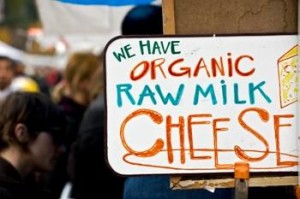William Herkewitz of Science Liner writes that in the United States some raw-milk cheeses are as illegal to buy and sell as Cuban cigars or imported ivory. Their crime? They haven’t been shelved for long enough. By federal law, all cheeses aged less than 60 days — usually soft cheeses like mozzarella or brie — have to be pasteurized (heated for sterility) in order to be sold.
The idea is that at 60 days, the fermentation processes taking place within the cheese will have naturally eradicated any harmful bacteria.  But the U.S. Food and Drug Administration (FDA) is currently reviewing its restrictions on unpasteurized, raw-milk cheeses, with the intent of elongating this time-period.
But the U.S. Food and Drug Administration (FDA) is currently reviewing its restrictions on unpasteurized, raw-milk cheeses, with the intent of elongating this time-period.
“Recent scientific literature has raised doubts about the efficacy of 60-day aging as an alternative to pasteurization,” says Marianna Naum, a policy analyst at the FDA.
Enacted in 1950, the 60-day rule was a compromise between cheese lovers and food safety experts, with the former concerned that pasteurization altered both the flavor and traditional methods of cheese making. But much has changed since 1950.
But recent multi-state fatal food-illness outbreaks of even older unpasteurized cheeses have convinced many food scientists that 60 days may simply not be long enough.
